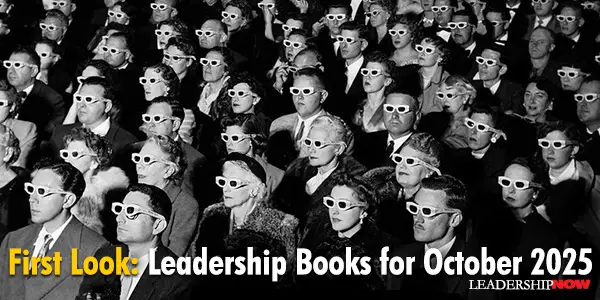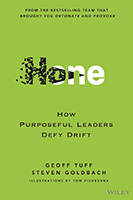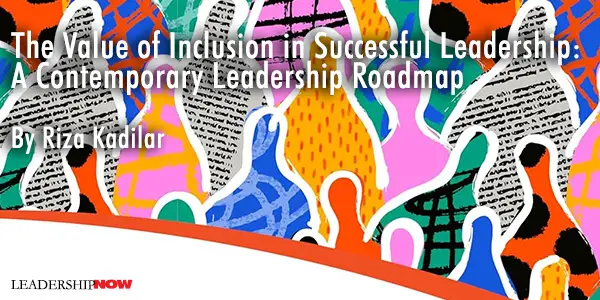 |
 |
10.16.25

Leading Thoughts for October 16, 2025
IDEAS shared have the power to expand perspectives, change thinking, and move lives. Here are two ideas for the curious mind to engage with: Zelana Montminy on pausing: “Give yourself permission...to stop sprinting on fumes. To admit the pace is breaking you. To feel the ache beneath the momentum. To stop performing energy you don’t have. You don’t need another protocol. Another cold plunge. Another fix-it morning routine. You need a moment to breathe without performing your peace. This summer, let slowness be sacred. Let rest be whole, without the guilt. Let the world keep pushing. You get to pause. You get to be real, not relentless.” Source: Finding Focus: Own Your Attention in an Age of Distraction Ian Wilson on not knowing: “We equate managerial competence with ‘knowing,’ and assume that decisions depend on facts about the present and about the future. Of course, the reality is that we have no facts about the future. However good our futures research may be, we shall never be able to escape from the ultimate dilemma that all our knowledge is about the past, and all our decisions are about the future.” Source: PDF From Scenario Thinking to Strategic Action Look for these ideas every Thursday on the Leading Blog. Find more ideas on the LeadingThoughts index.
Posted by Michael McKinney at 10:20 AM
10.09.25

Leading Thoughts for October 9, 2025
IDEAS shared have the power to expand perspectives, change thinking, and move lives. Here are two ideas for the curious mind to engage with: Robert Dilenschneider on respect: “ A starting point to develop and demonstrate respectfulness is to first respect yourself. You cannot respect others if you do not respect yourself. Paradoxically, gaining self-respect requires not looking to others for respect or validation. It is a quality that must come from within. Then, and only then, can it extend outwardly authentically.” Source: Respect: How to Change the World One Interaction at a Time Sébastien Page on debating with brilliant people: “‘Your idea is not you.’ He believes you should approach intellectual debates on technical or complex matters with open-minded curiosity and an unquenchable thirst for the truth. You shouldn’t take anything personally. Start by putting all the facts on the table. Too often, heated debates occur because people aren’t starting from the same facts. And before you disagree, take a second to point out something you agree on. Explain that you’re about to debate ideas, nothing personal. Encourage people to be clear when they’re playing devil’s advocate. With clear rules of the game and genuine respect amongst members, IQ-led debates can turn into positive experiences. There’s no reason to sacrifice relationships to get there. ” Look for these ideas every Thursday on the Leading Blog. Find more ideas on the LeadingThoughts index.
Posted by Michael McKinney at 08:42 AM
10.02.25

Leading Thoughts for October 2, 2025
IDEAS shared have the power to expand perspectives, change thinking, and move lives. Here are two ideas for the curious mind to engage with: Math teacher Dan Meyer on real-world problem solving: “What problem have you solved, ever, that was worth solving where you knew all the given information in advance? No problem worth solving is like that. In the real world, you have a surplus of information and you have to filter it, or you don’t have sufficient information and you have to go find some.” TED Talk: Math Class Needs A Makeover Bob Goff on focus: “We need to block our view of the things that hardly matter at all, stop returning to the patterns that do not serve our larger objectives, start recognizing what is temporary and transitory, and instead focus intensely on the things that will last forever: our faith, our families, and our purposes. When you direct your attention to these things, you will find your joy.” Source: Undistracted: Capture Your Purpose. Rediscover Your Joy Look for these ideas every Thursday on the Leading Blog. Find more ideas on the LeadingThoughts index.
Posted by Michael McKinney at 07:55 AM
10.01.25

First Look: Leadership Books for October 2025
HERE'S A LOOK at some of the best leadership books to be released in October 2025 curated just for you. Be sure to check out the other great titles being offered this month.
In the high-stakes world of corporate leadership, becoming a Fortune 500 CEO is an Everest-like ascent—with only the savviest managing to avoid falling off the mountain. In A CEO for All Seasons,you’ll find an essential climbing route that will take you through every stage. Unique in applying a number of sophisticated metrics to isolate the world’s top 200 CEOs, reduce them to a representative sample, and then reap their wisdom, the McKinsey team, in A CEO for All Seasons, spotlights the specific stage-based hurdles that CEOs face. From preparing for the role to starting strong to sustaining momentum to ensuring a lasting legacy, the book leaves no segment of the journey unmapped. Along the way, it offers proven strategies for maintaining forward progress and, crucially, alerts readers to common blind spots that can sabotage success, as revealed by a detailed survey of thousands of executives.
"Just be yourself" might be the worst advice you've ever received. For years, we've been told that authenticity is the key to success—that we should be true to ourselves, tune out others' opinions, and lead with unwavering genuineness. This feel-good message has spawned countless self-help books, leadership seminars, and viral social media posts. There's just one problem: science says it's wrong. Drawing on decades of research, renowned psychologist Tomas Chamorro-Premuzic reveals an uncomfortable truth: our obsession with authenticity is backfiring. From Silicon Valley's authenticity worship to failed diversity programs, he exposes how our fixation on our "true selves" undermines both individual and organizational success.
Ever wonder why some of our most effective leaders aren’t known for the skills we’ve been told are essential for great leadership? Would you describe Elon Musk or Steve Jobs as having empathy or humility? Of course not, and yet they’ve led teams that achieved extraordinary results. So, what leadership attributes, habits, and skills do cause teams to become more than the sum of their parts? Why does a team made of up superstars often underperform? What causes teams to work together effectively and produce high team intelligence? Jon Levy unpacks the myths that hold leaders and their teams back and points out the paradox of success: focusing on creating teams that operate well is what makes an effective leader, but focusing purely on the leader does almost nothing for the team.
Your mindset may be the only thing standing between you and your potential. Break free from the beliefs that hold you back. As a leader, do you find yourself frustrated, wondering why employees don't meet expectations, peers are slow to act, or pressure from your boss falls unfairly on your shoulders? It's easy to point a finger at others and double down on getting results. But have you ever considered that the problem might not be them—that it might be you? In Leadership Unblocked, Wilkins reveals seven key beliefs that hold leaders back, from "I know I'm right" to "I need to be involved" to "I don't belong here." Combining illustrative and powerful coaching conversations and research from the fields of neuroscience, leadership, and adult development theory, Wilkins offers a self-coaching guide for identifying, unpacking, and breaking through these barriers.
In Delivering the WOW, Fain shows how a culture united people around a mission, delighted guests, and unlocked extraordinary performance. Drawing on vivid stories from 33 years at the helm, Fain explains how a remarkable culture was forged and strengthened through: • Alignment: ensuring every employee understands the same clear mission, beyond hierarchy or titles • Intentionality: never losing sight of the ultimate goal and ensuring that every action, big or small, supports that objective • Continuous improvement: never being satisfied; always believing that there are ways to improve • Crisis response: deeply rooted culture as a stabilizing force during black swan events, including the global pandemic. Invaluable principles like these are woven into unforgettable stories which help explain how the company's profitability, guest capacity, and employee base all grew more than thirtyfold.
Robert Dilenschneider delivers an insightful and original discussion of how to cultivate respectfulness in every facet of your life. You’ll learn how to embody and encourage respectful behavior and speech among work colleagues, family, friends, and others. You’ll learn about how respectfulness has life-changing consequences for all who practice it and why it’s within reach for us all. You’ll also discover why it’s so sorely needed in an increasingly fragmented society and how it can transform our interactions for the better.
   
“You can't think well without writing well, and you can't write well without reading well. And I mean that last "well" in both senses. You have to be good at reading, and read good things.” — Paul Graham, Y Combinator co-founder
Posted by Michael McKinney at 08:58 AM
09.30.25

LeadershipNow 140: September 2025 Compilation
See more on
Posted by Michael McKinney at 11:20 AM
09.26.25

The Value of Inclusion in Successful Leadership
AS organizations navigate the complexities of the 21st century — marked by rapid technological advancements, evolving workforce demographics, and global socio-political shifts — the need for a fresh approach to leadership has never been more pressing. One of the most significant shifts in leadership thinking is the emphasis on inclusion as a core strategic imperative. Inclusion isn’t simply a fashionable term or corporate social responsibility checkbox; it’s a critical driver of long-term organizational success. Why inclusion is so important, and why now? Inclusion has become a focal point in organizational strategies because the world we live in is more interconnected, diverse, and complex than ever before. The rapid pace of technological change, the increasing mobility of the global workforce, and heightened societal expectations for fairness and equality are reshaping the expectations placed on leaders and businesses. But what makes inclusion so critical today, beyond the external pressures, is that, at its core, inclusion is about creating an environment where everyone feels they belong, valued, and able to contribute at their full potential. It goes beyond diversity, which focuses on representation, and encompasses how that diversity is leveraged. In an inclusive environment, individuals aren’t just invited to the table — they’re encouraged and empowered to participate fully and authentically. This enables organizations to tap into the vast reservoir of creativity, innovation, and insight that comes from diverse teams. Consider the analogy of a seed and its environment. A seed’s ability to grow depends not only on its inherent qualities but also on the conditions of the soil, water, and sunlight that surround it. Similarly, even the most talented individuals need an organizational culture that nurtures their growth and allows them to thrive. Without inclusion, diversity can lead to friction, isolation, and disengagement. But with inclusion, diversity becomes a powerful engine for innovation and problem-solving. The importance of inclusion is also underscored by the changing nature of work. As automation and AI reshape industries, organizations need to harness the full potential of their human capital. Diverse teams, when managed inclusively, have been shown to be more creative, better at problem-solving, and more adaptable in times of change. In fact, a study by McKinsey found that companies in the top quartile for gender diversity were 21 percent more likely to outperform on profitability, and companies in the top quartile for ethnic diversity were 33 percent more likely to have better financial performance. Inclusion fosters a culture of psychological safety where individuals are encouraged to take risks, voice unconventional ideas, and challenge the status quo — key ingredients for innovation in the digital age. Additionally, the rise of AI poses a unique risk. If AI systems are trained on biased data or monocultural perspectives, they risk perpetuating and amplifying existing inequalities. Leaders must be mindful of how they design inclusive environments not only for their human employees but also for the technologies that will shape the future of work. Inclusion, therefore, isn’t just a moral or ethical imperative; it’s a strategic necessity. Organizations that fail to embrace inclusion risk falling behind, not only in their ability to attract and retain top talent, but in their capacity to innovate and adapt to the challenges of the future. Rethinking leadership for the future One of the most profound shifts in leadership thinking is the move from leading individuals to leading relationships. In the past, leadership was often about managing people — assigning tasks, overseeing performance, and ensuring compliance. But as organizations flatten their hierarchies and embrace cross-functional, team-based structures, the real leadership challenge is in managing the relationships and dynamics within teams. How team members interact, share information, and resolve conflicts is often more critical to success than the performance of any one individual. In this context, the role of the leader is to act as a facilitator — someone who nurtures trust, fosters open communication, and ensures that every team member feels heard and valued. This requires a high level of emotional intelligence and the ability to create a psychologically safe environment where people can express vulnerability and dissent without fear of retribution. Leaders who excel in this area are able to harness the collective intelligence of their teams, leading to more innovative and effective outcomes. Another important shift in contemporary leadership is reflected in the increasing emphasis on purpose-driven leadership. Today’s employees, particularly Millennials and Generation Z, want to work for organizations that align with their values and contribute to the greater good. Leaders who can articulate a clear sense of purpose and connect their team’s work to a broader mission are better able to inspire and engage their employees. Purpose-driven leadership supports inclusion because it creates a common goal that transcends individual differences and unites people in pursuit of something bigger than themselves. A third contemporary leadership shift involves asking the right questions. Leaders today aren’t expected to have all the answers — in fact, it’s impossible to in these times of rapid change and complexity. Instead, effective leaders are those who ask the right questions, challenge assumptions, and encourage a culture of curiosity and continuous learning. This approach is particularly important for inclusion because it encourages leaders to seek out diverse perspectives and question their own biases. One of the most powerful questions a leader can ask is, “Whose voice are we not hearing?” By actively seeking out the perspectives of those often excluded from decision-making processes, leaders ensure their organizations are truly inclusive. The roadmap for increasing inclusion capacity Building an inclusive culture isn’t a one-off initiative; it’s an ongoing process that requires intentionality, reflection, and action. Follow this roadmap for increasing inclusion capacity in your organizations: 1. Measure inclusion and listen to your employees The most effective way to understand whether an inclusive culture exists in your organization is to ask the people within the organization. Surveys and feedback mechanisms can provide valuable insights into how employees feel about their ability to participate and belong. For example, ask employees to rate various aspects of their experience — whether they feel listened to and recognized for their contributions. These ratings can help leaders identify specific areas where inclusion efforts may be falling short. For example, if employees report feeling excluded from decision-making processes or if certain groups consistently score lower on measures of inclusion, leaders can take targeted actions to address these issues. 2. Model inclusive behaviors Inclusion isn’t just about policies and procedures; it’s about behaviors. Leaders must model the inclusive behaviors they want to see, such as being intentional about recognizing and celebrating diverse perspectives, fostering open communication, and creating spaces where all voices can be heard. One way to reinforce inclusive behaviors is by establishing inclusion ambassadors — individuals who champion inclusion across the organization and serve as role models for their peers. For example, in large multinational corporations, inclusion ambassadors might be tasked with identifying and sharing stories of inclusion in action. Perhaps it's a manager who goes out of their way to mentor underrepresented employees or a team that collaborates across departments to solve a complex problem. In highlighting these examples, organizations build momentum around inclusion and encourage others to follow suit. 3. Get to know your employees beyond their job titles Inclusion requires leaders to go beyond surface-level understanding and develop deeper relationships with their employees. This means getting to know what motivates them, their values, and how they respond in different circumstances. Organizations can facilitate this by creating opportunities for employees to share their stories and connect with one another on a personal level. This could take the form of hobby groups or cross-functional projects that encourage collaboration between employees who may not typically work together. 4. Equitable treatment, not equal treatment A common misconception about inclusion is that it involves treating everyone the same. Yet true inclusion recognizes that different people have different needs, and equitable treatment requires acknowledging and addressing those differences. For example, a working parent may need flexible hours, while an employee with a disability may need certain accommodations to perform their job effectively. Leaders must be attuned to these needs and ensure that every employee feels supported in a way that enables them to contribute their best. 5. Recognize and celebrate good work Recognition is a powerful tool for fostering inclusion, but it must go beyond individual achievements. In an inclusive culture, recognition should be about celebrating the collective success of teams and acknowledging the contributions of all members. Leaders should make it a point to regularly recognize not only what their employees achieve but also how they achieve it — highlighting behaviors that promote collaboration, empathy, and inclusion. Celebrating successes collectively reinforces the idea that everyone’s contribution matters and helps to build a sense of shared purpose. It also creates a culture where employees feel encouraged to support one another, rather than compete for individual accolades. 6. Commit to continuous learning Leaders and employees alike must be open to learning about their own biases, understanding different perspectives, and developing the skills needed to support inclusion. Organizations that prioritize continuous learning are better equipped to adapt to changing demographics, market conditions, and technological advancements. They’re also more likely to foster a culture of innovation, where diverse perspectives are valued and new ideas are encouraged. Essentially, inclusion isn’t just a nice-to-have — it’s a strategic imperative for organizations looking to succeed in today’s complex, fast-paced world. As we move forward into an increasingly diverse and interconnected world, the organizations that thrive will be those that not only embrace diversity, but also create the conditions for true inclusion. Now is the time for leaders to step up, model inclusive behaviors, and guide their teams toward a more inclusive, prosperous future.  
Posted by Michael McKinney at 04:43 PM
09.25.25

Leading Thoughts for September 25, 2025
IDEAS shared have the power to expand perspectives, change thinking, and move lives. Here are two ideas for the curious mind to engage with: Matt Cooke on surrender: “Surrender isn't giving up; it's letting go of the need to control what's never been yours to carry. There's power in releasing the grip. In trusting the process even when you can't see the outcome. You weren't meant to figure it all out; you were meant to feel your way through it. When you surrender, you create space. When you trust, you allow movement. That's where things shift, not through force, but through flow. So, if it feels uncertain right now, that's okay. You're not lost. You're just in the space between. Let go. Lean in. And trust that what's meant for you knows exactly how to find you. So, remember, surrender isn't giving up, it’s allowing in.” Source: Beyond Wanting: The Art of True Manifestation William Vanderbloemen on self-awareness: “Being self-aware makes you better at finding solutions. Knowing yourself comes with a guaranteed pinch (or more) of humility, so when a self-aware person is faced with a challenge, they can decenter themselves from the issue. Being self-aware is knowing all about you while knowing that it’s not all about you. Whatever the crisis, the Self-Aware remain even-keeled and committed to the goal. A great summary of how self-awareness can serve you in a crisis is the first few lines of Rudyard Kipling s “If.” It’s all about keeping calm while others are losing their heads.” Source: Be the Unicorn: 12 Data-Driven Habits that Separate the Best Leaders from the Rest Look for these ideas every Thursday on the Leading Blog. Find more ideas on the LeadingThoughts index.
Posted by Michael McKinney at 12:23 PM
09.19.25

The Collective Edge
THE group(s) we identify with influence who we are – our thinking and behavior. We are a reflection of the groups we identify with. In The Collective Edge, Colin Fisher explains that “Understanding human behavior means understanding group dynamics—the obvious and hidden ways in which our thoughts, feelings, and behaviors are shaped by groups.” In addition, “Whether you want to change yourself, your work group, or the world, you need to work with the invisible forces of group dynamics instead of being mindlessly pushed around by them.” We tend to think in terms of individual actors rather than groups, especially when it comes to leadership. Whether things go right or wrong, we look for individualistic explanations, overlooking the role of groups. Fisher reimagines leadership “not as the province of individual heroes and villains, but as a team sport in which we all do our part to improve and maintain our groups’ fundamental structure.” Cooperation depends on the group. We tend to overemphasize the individualistic mindset, focusing on the individual rather than the influence of the group the individual is a part of. The answer to many of today’s problems rests in group dynamics. “Groups offer: a vehicle to accomplish what you can’t do alone and provide a sense of belonging.” Under what conditions does effective collaboration take place? Group synergy requires differences in what people know, think, and do. When a group is too similar in thinking, we get conformity. Too diverse, and the group may struggle to come together, but that’s not always the case. Conformity is not all bad, as we might first imagine. We need some conformity to cooperate. The need to fit in is one of the most powerful forms of social control over human behavior. “Being a member of a group changes how people see reality. Two groups can see the same event but believe wildly different things about it. Groups are a lens through which members view what is true. When a situation is new and uncertain, norms emerge quickly and most people fall in line rather than sticking up for their own (weakly held) points of view. In fact, many people adopt group norms so quickly, they don’t even realize they changed their own views.” When we disagree with others, we should become like detectives. “When there’s disagreement, members should ask: ‘Why did you think that? What led you to that view?’” Seek out information before making a decision or judgment. When adding new members to our group, before rushing in to indoctrinate them, we have an opportunity to learn. In doing so, we help fight conformity. Other people think differently from us, and hearing their perspectives helps us make better decisions. “Competition is a powerful motivator, but you need to know when it helps and when it hurts performance.” Done right, competition can bring out the best in others. But competition is often not about getting better but winning. Something to keep in mind: “When you are doing well-mastered tasks, competing can spur you on to new heights. But when you are still learning, competing is likely to hurt you.” The productive side of conflict is called task conflict—differences in ideas—how or what. But when disagreements turn personal, we have relational conflict. Relational conflict derails the group from problem-solving and breeds contempt and the cohesion of the group itself. Group splits are common when relational conflict arises. “Intergroup conflict can temporarily be put aside when we find common causes that allow us to see ourselves as part of a larger, shared group.” We’ve seen too many groups split because they can’t work from what they share in common. There are people in every group who try to stir up trouble. “They’re the ones who try to keep groups apart and encourage prejudice and conflict. Those who look to blame any problem on the other group and stoke anger. Those who demonize and dehumanize others.” A productive group will keep the conflict focused on the task and not on other people. Fisher says, “The main signs of relationship conflict I look for are personal attributions, or when members start talking about others in terms of traits or dispositions rather than the specific issue at hand.” Group leadership should be shared. We all share a responsibility to the group. “People use ‘leadership’ as a cognitive shortcut when trying to understand the causes of complex collective phenomena.” We look at the wrong thing. 
Posted by Michael McKinney at 06:27 PM
|
BUILD YOUR KNOWLEDGE
 

How to Do Your Start-Up Right STRAIGHT TALK FOR START-UPS 
Grow Your Leadership Skills NEW AND UPCOMING LEADERSHIP BOOKS 
Leadership Minute BITE-SIZE CONCEPTS YOU CAN CHEW ON 
Classic Leadership Books BOOKS TO READ BEFORE YOU LEAD |